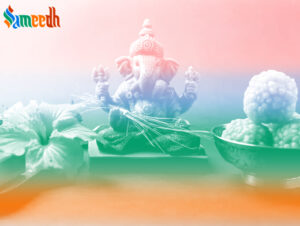Ganesh, the elephant-headed god, is one of the most revered deities in Hinduism, worshipped as the remover of obstacles and the god of wisdom. Durva grass (Cynodon dactylon), also known as Bermuda grass, holds special significance in the worship of Ganesh.

There are several legends explaining the association between Ganesh and Durva grass:
- Durva Grass in Ganesh’s Hair: One popular myth is that during a battle between Ganesh and the demoness Matsya, Ganesh’s tusk was broken. To heal the wound, durva grass was applied to it. In gratitude, Ganesh declared that durva grass is very dear to him and blessed it with spiritual significance.
- Durva Grass Offering by Kuber: Another story comes from the Kuber : Varaha Puran. It is said that once, Lord Kuber, the god of wealth, presented a special durva grass to Lord Ganesh as an offering during a grand yajna (sacrificial ritual). Ganesh, pleased with Kuber’s devotion and sincerity, declared that whoever worships him with durva grass would receive his blessings.
- Ganesha and the Moon: In yet another legend, Ganesh is known for his love for sweets, especially modakas. Once, while enjoying his favorite delicacy, he ate so many that his belly became round and huge. To aid his digestion, Ganesh mounted on his vehicle, the mouse (Mooshika), and took a few rounds. During this ride, a few durva grass blades fell from his hands, and they were later picked up and worshipped by devotees.
- Symbolism of Durva Grass: Durva grass is considered a symbol of purity and freshness. Its ability to withstand harsh conditions and still remain green is seen as a representation of resilience. Offering durva grass to Ganesh is believed to symbolize the devotee’s surrender of the impurities and challenges of life to the divine, seeking Ganesh’s blessings to overcome obstacles.
In Ganesh worship, it is customary to offer durva grass as part of the rituals. Devotees often present a specific number of durva blades, such as 21 or 108, to Ganesh during prayers and rituals. The presence of durva grass in Ganesh worship has become a significant tradition, and it is believed to bring good luck, prosperity, and the removal of obstacles.